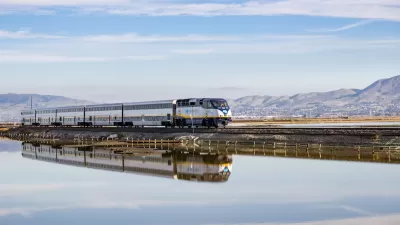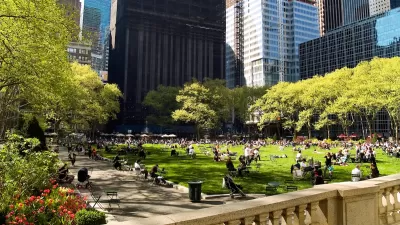Next American City chats with Randal O'Toole -- the "Anti-Planner" -- about the problems of planning and what makes the ideal city.
Next American City: "What's our ideal city? You're always the critic, but if you didn't have to be, if everyone listened to Randal O'Toole and followed your prescriptions, what would that look like?"
Randal O'Toole: "To start with, I worked for 15 years for environmental groups, so I was identified as an environmentalist, and then I've worked for the last 15 years for libertarian groups and I'm identified as a libertarian. But the truth is I'm a pragmatist. I want things that work fine. And, you know, spending millions of dollars and getting very little result and return is not something that work.
[ ]So, I'm a pragmatist. I don't a vision of what a city should look like, I have a vision of a process that allows people to live in the kind of city they want to live in. There's a significant amount of people that want to live in a city like Manhattan or San Francisco. And there's a significant amount of people who want to live in a city like Houston. And what I want is a process that allows people to live in whatever kind of city they do want to live in. I think that if a process were implemented that basically allows property owners to do what they want with their property as long as they're not directly harming other people, and basically allows people to decide how they're going to get around based on the real cost of transportation – making sure that auto drivers pay the full cost of their travel and making sure that people who ride transit pay the cost of they're transit, with, perhaps, subsidies for low-income people who need help – if they have that kind of system I think most American cities would look a little more like Houston and Omaha then San Francisco or New York. But we'd still have dense areas – we'd still have Manhattan, we'd still have downtown San Francisco, for the people who want to live in places like that."
FULL STORY: An Interview With Randall O’Toole, the Anti-Planner

Alabama: Trump Terminates Settlements for Black Communities Harmed By Raw Sewage
Trump deemed the landmark civil rights agreement “illegal DEI and environmental justice policy.”

Planetizen Federal Action Tracker
A weekly monitor of how Trump’s orders and actions are impacting planners and planning in America.

The 120 Year Old Tiny Home Villages That Sheltered San Francisco’s Earthquake Refugees
More than a century ago, San Francisco mobilized to house thousands of residents displaced by the 1906 earthquake. Could their strategy offer a model for the present?

Ken Jennings Launches Transit Web Series
The Jeopardy champ wants you to ride public transit.

BLM To Rescind Public Lands Rule
The change will downgrade conservation, once again putting federal land at risk for mining and other extractive uses.

Indy Neighborhood Group Builds Temporary Multi-Use Path
Community members, aided in part by funding from the city, repurposed a vehicle lane to create a protected bike and pedestrian path for the summer season.
Urban Design for Planners 1: Software Tools
This six-course series explores essential urban design concepts using open source software and equips planners with the tools they need to participate fully in the urban design process.
Planning for Universal Design
Learn the tools for implementing Universal Design in planning regulations.
Clanton & Associates, Inc.
Jessamine County Fiscal Court
Institute for Housing and Urban Development Studies (IHS)
City of Grandview
Harvard GSD Executive Education
Toledo-Lucas County Plan Commissions
Salt Lake City
NYU Wagner Graduate School of Public Service





























